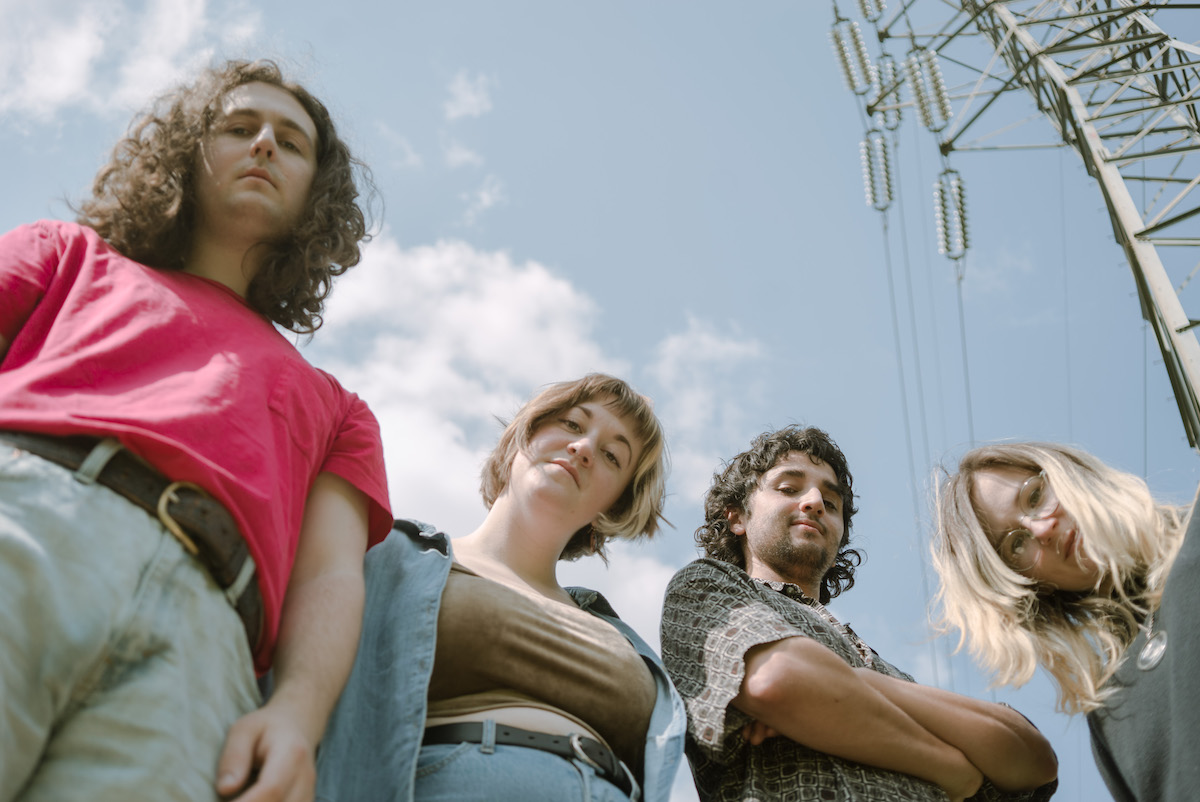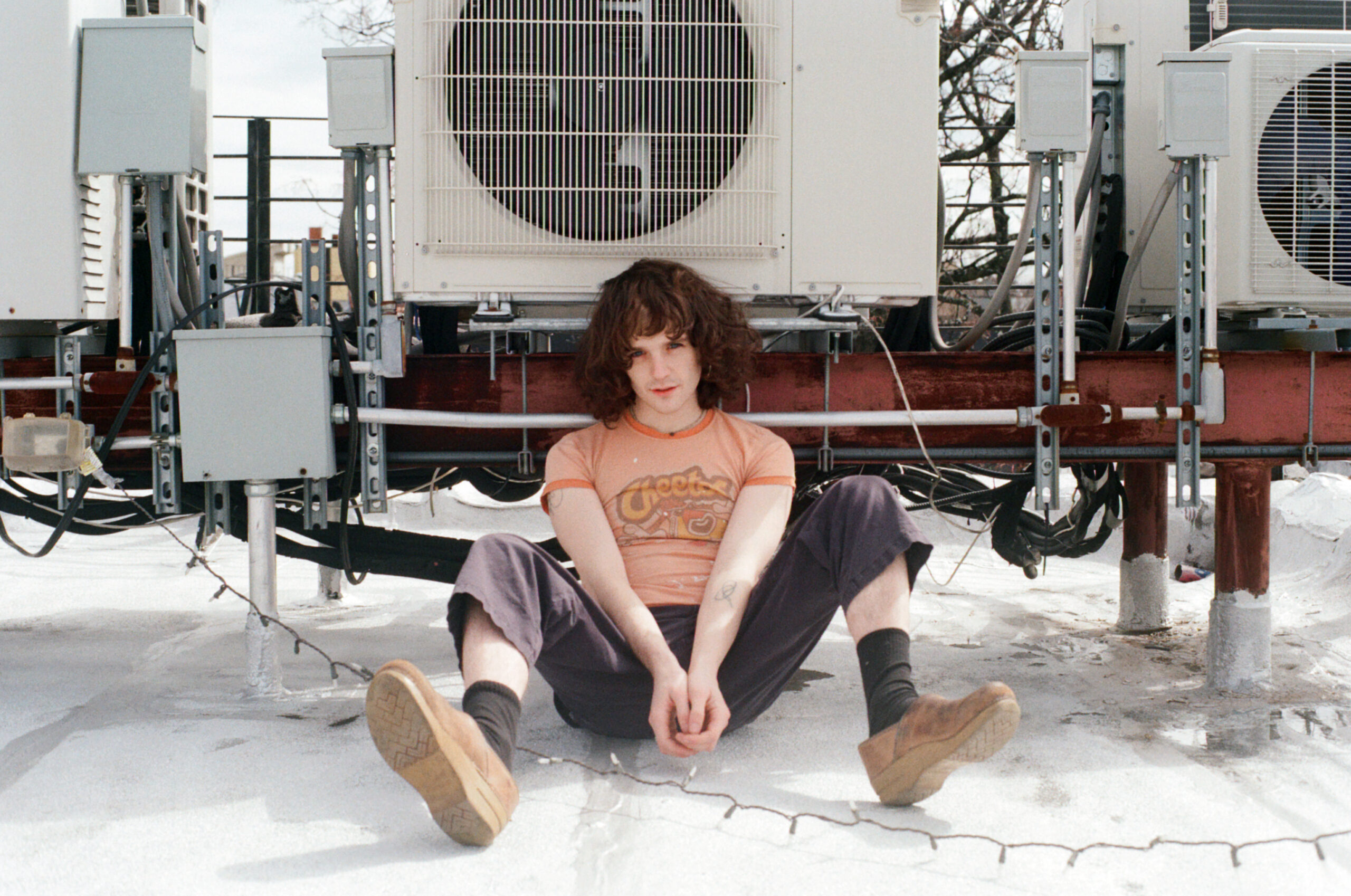"Maybe the fuss was worth it in the end."
"Yeah, I think the fuss was worth it in the end."
The members of Truth Club are ping-ponging off each other about how their one-off single "It's Time" came to be. The song has been around for a while -- they first played it live on tour in support of the North Carolina band's 2019 debut Not An Exit. But it felt appropriate to release it early this year, as a way to usher in a new era of Truth Club.
It was the first song that the four of them wrote together from start to finish as a cohesive unit. It went through all the fits and starts one might expect from a track that's so textured: it was too busy, not busy enough, there are "deranged" voice memos that show the song in its (by their account) embarassing nascent state. But they sat on it until they felt that it was done -- a lesson learned in being more patient with the songs that they're creating.
The fuss was worth it. "It's Time" finds Truth Club in top-notch form. An irregular rhythm propels the band's tangle of guitars, alternatingly spiky and sweet. Travis Harrington's dense lyrics add yet another wrinkle: "I watch this one last busy week crestfall and dissolve the intentions you set ... and I will watch it happen again." It builds and refines on the post-punk scrawl of their debut, which we were fans of around these parts -- we named Truth Club one of the best new bands to emerge from 2019. But no one song on it had the confident execution that "It's Time" has. It bodes well for their future -- and their past.
Because they didn't end up recording "It's Time" until after their (yet announced) sophomore album was already done. So it represents the band as it was -- when their "blades were sharp," as Harrington put it -- and as how it could be going forward. They explain all this to me while we're crowded around a too-small table at Wilmington's Greenfield Lake, where I have on more than one occasion stumbled across empty styrofoam packages left over from when people decided to feed meat to the alligators that roam the park.
Harrington and Kameron Vann grew up around here. They started playing music together in middle school. What began as a friendship built around skateboarding and marathon sessions of Rock Band morphed into Astro Cowboy, the band that they started in high school. They eventually set out to different parts of the state for school; Vann headed to Boone and Harrington landed in Raleigh, which is where he started Truth Club with Elise Jaffe. Harrington and Jaffe worked on Truth Club's first songs together; when planning a week-long tour in 2017, it felt natural to recruit Vann to learn the songs and come out on the road with them.
As a trio, they recorded their debut album Not An Exit later that year. By then, Yvonne Chazal had already been friends with the band for a while; she was around when they recorded it and contributed to a few of the songs, but didn't formally come into the fold until after the album was finished (though before it was released). That means Truth Club as it exists now is a subtly but also significantly different band than when they first started out.
"When I was starting Truth Club with Elise, I was the one who said 'I want to start a band with you,' so I feel like I had a lot more songs backloaded, so to speak, and I had all these thoughts about how everything should sound," Harrington said. "Over time, it's become more trusting. I still bring ideas to the table, but there's much more of a conversation. It's grown into a much more collaborative thing, as we've learned to communicate more easily with each other about the music."
"Truth Club was the first band that I was ever in," Jaffe said. "I played music for as long as I can remember, but before it was always classical stuff. Going in and writing my own parts for something, working on a song and not just playing sheet music that was given to me -- it was a process to get used to."
Adding another member to the band was also something that took some getting used to. "Contrasting with when it was just three people playing, everyone had their own lane -- guitar lane, bass lane, drum lane," Chazal said. "And then when it became four people, it became a space that needed to be negotiated a little more. And I think when that happened, we had to get more collaborative -- think about how much space is available for certain things."
HARRINGTON: "To serve the song better. Because I think that's what we're always trying to do when we're writing together: make sure that none of us are playing too much, are on top of each other sonically. That's been a hard but ultimately fruitful process to figure out. When Yvonne joined the band, it became such a different process and sound. I had never really thought about writing songs and framing them within the context of, 'Oh, there's going to be someone else playing guitar too other than myself.' It was hard to figure out how to all get on the same page -- to write an arrangement that would account for another person."
VANN: "It makes sense, too, because when we played in Astro Cowboy, you played guitar and I played drums, We had a bass player, but you became such a good guitar player, holding down melodic motion on the guitar while also keeping the bass structures and rhythm underneath it. And so because you were trained in that way..."
JAFFE: "You were coming in with these guitar parts that had a chord and an implied bass note and also a melodic... You'd be doing multiple things and we'd be like, 'Hey, there's not much room to do other stuff on top of this.' I feel like you changed the way you've been bringing things to the band."
HARRINGTON: "It's interesting to think about. The style that I came to this band with was born out of the necessity of when we would write songs together and didn't have anybody, when it was just a two-piece for a while when we were writing songs in high school. So I was like, 'OK, I just gotta play everything, I guess.' It's cool that that's not the case now."
VANN: "That's part of the challenge -- filling out that space."
The new Truth Club songs are more chaotic and involved than what the band was doing before. Take "Blue Eternal," the single that they're releasing today -- the first at their new label home of Double Double Whammy. Harrington called this one of their "fast, short songs" (as opposed to the other type -- "long, slow"). It's a bleary, jittery smudge that almost, but not quite, coalesces around Harrington's muffled intonations: "Found you again, whispered a world so estranged/ I’m unsure how it was conjured/ Held in the wave of some vibration:/ A trace of our trial stuck in its cycle." The whole song sounds off-kilter in the best way, and it slots in nicely next to the strain of grimy but melodic music that has been emerging from North Carolina over the past few years.
Truth Club have connections with some of the state's guiding lights. Harrington has known Indigo De Souza for years: "Funnily enough, she was somebody that I met through my parents, so we knew each other when we were little kids, and kept in touch on and off," he explained. "When Truth Club first started playing out of the Triangle, I invited her to come to our first show and reconnected." They ended up recording their new songs at Drop Of Sun in Asheville with Alex Farrar, who the band first met when they opened for Indigo De Souza at a show at Grey Eagle in 2021.
And Wednesday's Karly Hartzman -- who has also toured with the band and recorded two albums with Farrar -- nudged Double Double Whammy to take another listen to Truth Club when they were shopping their album around. They also have a sentimental attachment to Mike Caridi, the co-founder of DDW, who makes music as the Glow and was also a member of LVL UP. Truth Club played their second-ever show with LVL UP when they came through Durham on tour with Palm in 2017. After another local band dropped off the bill at the last minute, they worked up the courage to ask to be the opener.
In the past year, Truth Club have also had the opportunity to open for Duster and play shows with Protomartyr, two of their heroes and influences. "The feasibility of playing with bands that we admire has become a real possibility, and that in itself has been really rewarding," Jaffe said. As with most musicians, the ideal would be able to get to a place where the band is a full-time engagement. But for now the members of Truth Club still hold down day jobs: Harrington powder-coats guitar pedal enclosures, Vann works in a greenhouse, Chazal is a teacher turned tutor, Jaffe is in product development.
"It's hard to frame this without seeming like there's some underlying desperation to it, but for me personally it would be cool to be able to do this in a way that's sustainable to just do it -- provide the bare necessities, where I can live off the income to some extent," Harrington said. "My framework on how to live life, quote-unquote, and how to process emotional insights and make community and friendships -- that's all been facilitated and only makes sense through music. When I try to think about what I would do otherwise, it's hard to wrap my head around."
They value the community that they've built up over the years: "Indigo and Wednesday, we all started playing shows together at the same time," Harrington said. "It was so insular at the time -- us just playing around North Carolina with each other -- and it's really cool to see their music get the well-deserved recognition that it should. They've been so helpful to us ... and I only hope that we can keep that dynamic -- that other peers and friends of ours whose music we admire and feel in community with, that we can help those people out too, passing it forward."
"The music is huge, obviously -- we are all obsessed with music," Chazal said. "But the connections are really the thing that matter most."
"We've been in it for so long," Vann added. "It really shapes you."
//
"Blue Eternal" is out now via Double Double Whammy.
We rely on reader subscriptions to deliver articles like the one you're reading. Become a member and help support independent media!






